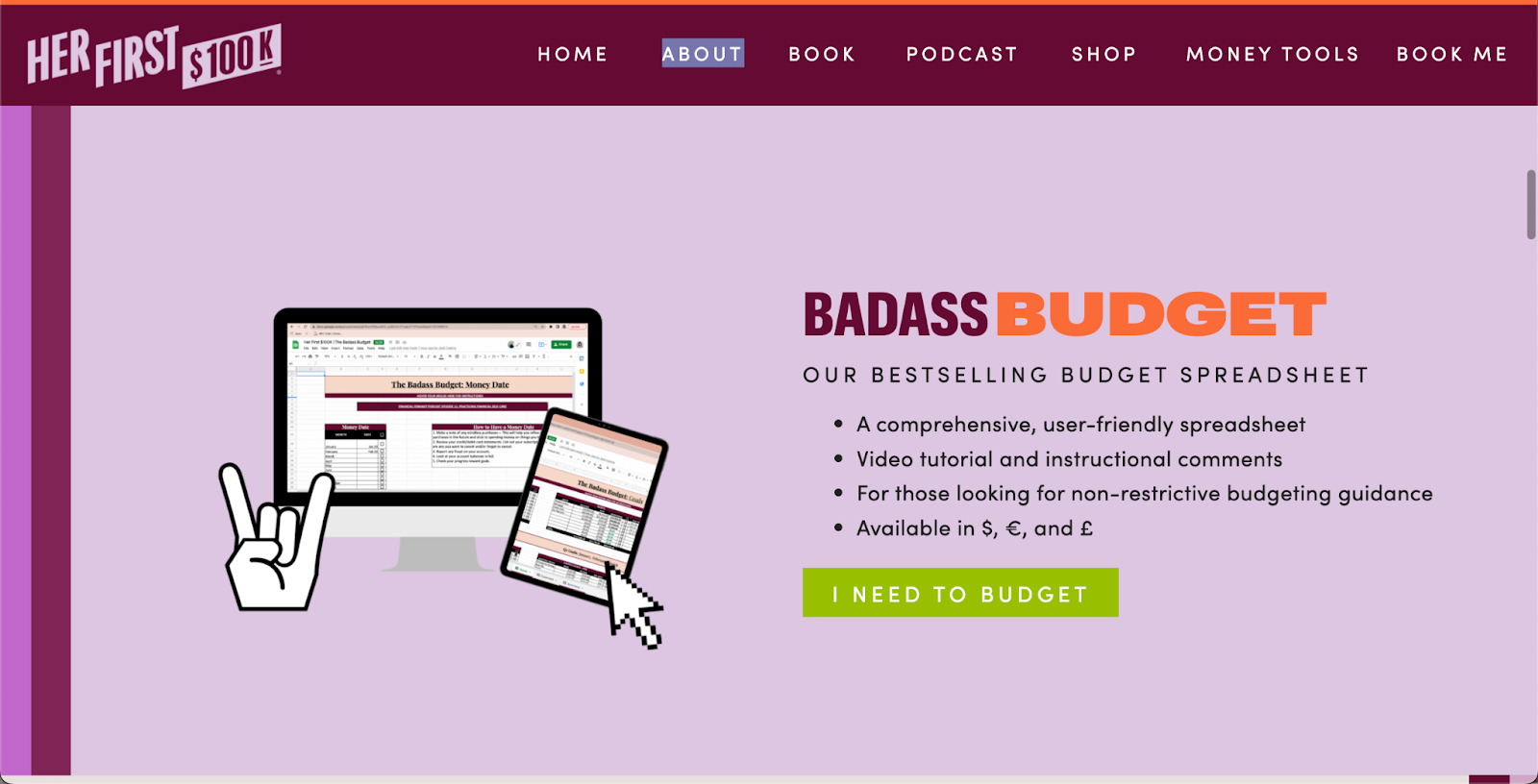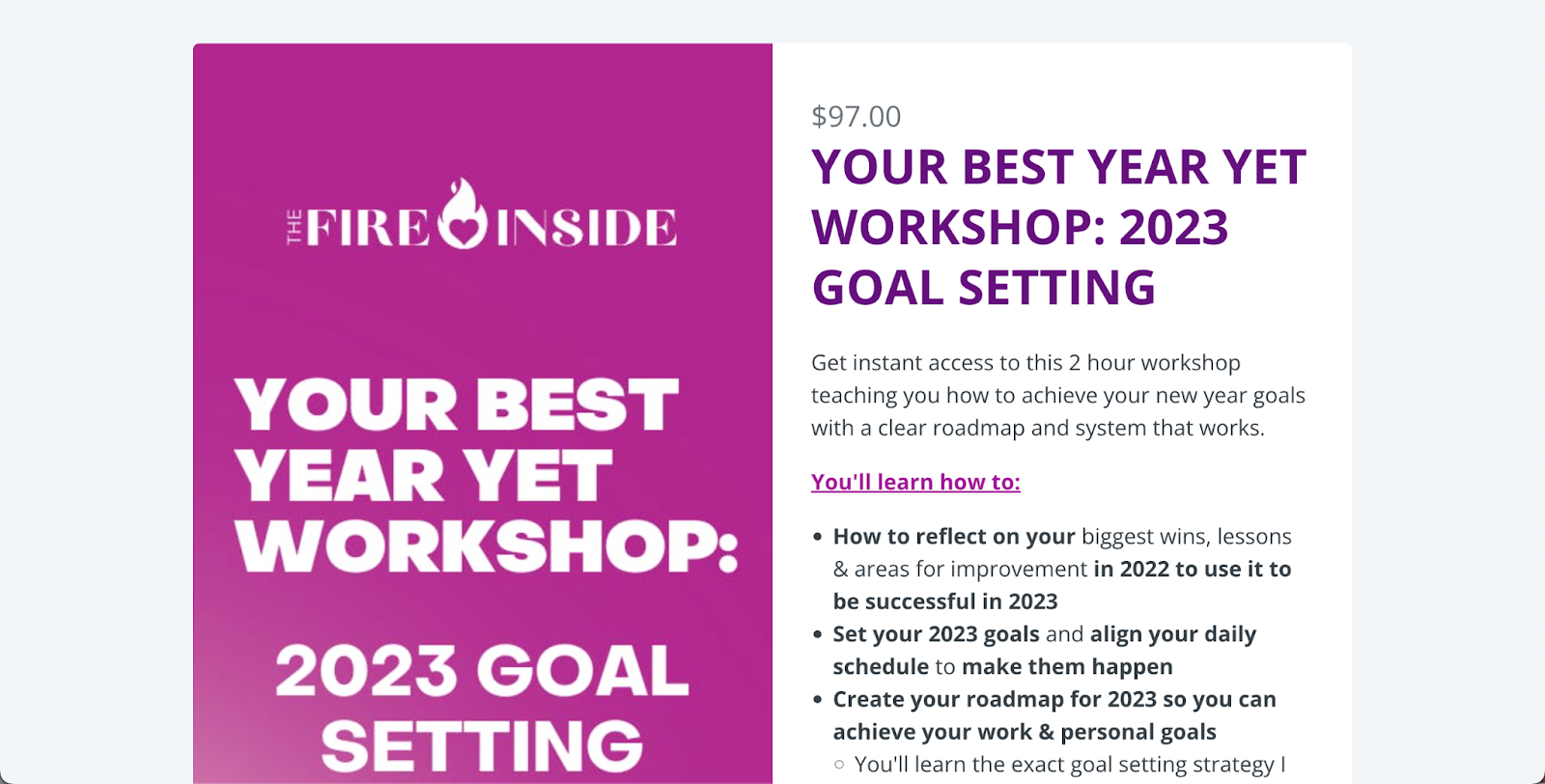There is no question that selling digital products is one of the best ways for content creators to diversify their income. Digital products are time and money-efficient to create and can be a phenomenal way to make passive income. And who does not want to make money while they sleep?
While the benefits of selling digital downloads are clear, figuring out how to sell digital products and most importantly–where to sell digital products can be challenging for many. While it might seem that selling digital products on marketplaces like Etsy is the right thing to do, because of how easy and accessible they are, actually, it might not be the smartest business decision.
So, let's talk about why selling your digital downloads on marketplaces might not be the smartest online business strategy and what might be a better, more successful alternative.
Why selling digital products deserve more than just a marketplace
Marketplaces: convenience with caveats
There is no denying that marketplaces like Etsy, Creative Market, and others are extremely attractive when it comes to choosing a digital sales platform to sell your digital downloads. They are easy to navigate and do not require skills to set up and open an online shop.
However, there are also some big cons that these marketplaces have, which can seriously impact how successful your digital download business will be.
Limited branding & customization
All of the marketplaces have either no branding and customization options or offer very little customization. Most often, you can add a banner and upload your own digital product imagery which is branded, but that is as far as customization goes.
While it might not seem important, branding plays a huge part in the long-term success of your business. When your products do not stand out, and blend in with the rest of the shop, people are less likely to notice you and become long-term customers. Also, a lack of branding and customization makes it difficult to stand out in the crowd, which can seriously impact your sales.
High fees & commissions
While creating an account and opening an online store does not cost money on most marketplaces, there are always fees and commissions they charge to either upload products or take when you sell a product. That means that you are not keeping all the profit you make, and it can quickly add up. Especially, when you have to consider that your prices have to be competitive to gain customer's attention.
Less customer data & control
Most of the marketplaces have limited analytic tools. What does that mean for your business? Well, it is hard for you to analyze customer behavior and see what works for your business and what doesn't, and where you might need to pivot or improve.
Having access to analytics can help you sell more products, and really understand what your customers are looking for, and how they behave when they shop.
Beyond the marketplace: owning your space
Okay, now that you know the reality of selling digital products in online marketplaces, let's talk about how it would look like to sell your products outside them. As with everything, there are pros and cons to selling independently.
Building a strong brand identity
When you own your platform where you sell digital downloads, you have full control over branding. It is important because it means that your digital product shop can be aligned with the rest of your brand, and is easy to recognize for your audience.
Plus, having your online store cohesive with the rest of your brand allows you to charge premium prices for your products. It tells people that your brand is reputable, trustworthy, and has high standards, which means that your products will be valuable and worthy of their money.
Maximum profit margins & revenue potential
When you sell independently, there are no hidden fees. There will be certain costs associated with running an online store, but those are pretty minimal and fully in your control. So, you get to keep all the money you make, and you can set your prices without worrying whether or not your competitors on the platform are charging more or less and how it might impact your sales.
Deeper customer relationships & insights
Lastly, selling your digital downloads independently often gives you more tools to manage your customers and analytics. You will have better access to sales data, and you will be able to implement sales tactics that allow you to increase your sales.
Finding the right solution: platform vs. website
The pros and cons of selling in the online marketplace and independently are clear. The next step is to figure out which independent way of selling your digital downloads is the best for your business. There are two main options:
- Using a platform: you can sell digital downloads on Teachable and other similar platforms.
- Building a custom website: using WordPress and code, build a custom e-commerce website to sell your digital downloads.
Both options have pros and cons, and while they are similar in many ways, they offer slightly different experiences. Which one you will choose will depend on your personal preferences and business needs. So, let's discuss the pros and cons of both.
Platform pros and cons: ease of use & pre-built features
Choosing a platform like Teachable to sell your digital downloads has many benefits. It allows you to run your business from one place–you can have online courses, digital downloads, and much more altogether.
Another benefit of using a platform is the ease of use. Teachable platform is created with content creators in mind, and the platform allows you to create custom landing pages that align with your brand, but do not require coding or website-building skills. You can put your digital product up for sale in a matter of minutes.
It also has features that allow you to use your digital downloads as upsells for your online course, which can greatly increase your average order value. Plus, Teachable handles taxes for you, so you do not have to worry about doing it yourself.
Website pros and cons: complete control & flexibility
When it comes to custom websites, the biggest advantage is the full control you have over every single part of your e-commerce store. You can build a store that has every feature you want, and it gives you full control and flexibility over the design and branding.
But one downside that goes hand in hand is that you either have to have coding and website-building skills yourself, or hire help. While it can be great for larger businesses, smaller content creators might not have the resources.
Choosing the right fit for your needs & budget
Which option you choose for selling your digital items comes down to what your business needs are. If you do have a budget, and you want to be fully in control of every aspect and feature of your online store, then you might choose to build a custom e-commerce website.
If you are a smaller content creator who simply wants to expand your income sources, then choosing a platform like Teachable might be a better option for you. It allows you to work with any budget, integrate your online course business with your digital download business, and not worry about handling the taxes.
Building your sales engine: features & strategies
Selling independently comes with a unique set of challenges. While the payback is high, there will be a learning curve to figure out the best way to sell your digital products for your business. So, let's discuss some essential things you should keep in mind before you set up your digital download store.
Secure payment gateways & download management
The first thing you want to figure out is how you will be processing payments and managing deliverables. This is one thing that marketplaces do for you, and it is why so many creators find them appealing. Processing payments is key to running a profitable business, and you want to have an efficient system. The same goes for download management–the smoother the process, the less your customers will be likely to complain.
If you choose to build a customer website, you will have to put payment processing systems and download management systems in place yourself. Software like WooCommerce can be a huge help, but it can take time to figure it out.
If you do choose to go with a platform like Teachable, then payment processing, taxes, and download management are all taken care of for you. You simply have to create the products and upload them online.
Effective marketing & customer acquisition
Probably the most important thing when running an online store is driving traffic and turning it into sales. When you sell on marketplaces, you have the chance of being discovered in their search. So, you can optimize and target keywords. You might also pay for advertising within marketplaces to increase your visibility.
With an independent online store, you will have to create a marketing plan and a sales funnel. You will need to market and promote your business on social media, or through ads to drive traffic to your digital downloads.
So, it's essential to be prepared and have a solid marketing strategy. Think of it as a long-term endeavor too. What marketing tactics will allow you to not only generate sales today but also help you find long-term success?
Things like email marketing are essential for building trust and relationships with your audience long-term. Not every single person who finds your digital downloads will be ready to buy on the spot. That is where nurturing a relationship comes into play–get the interested people to your email list where you can build a close relationship and convince them to buy your products.
Also, the more marketing channels you have, paid and organic, to attract new audiences and engage with your current ones, the better your business will do in the long term. However, it is equally as important that you choose marketing channels that are easy for you to maintain and stay consistent with.
Content delivery networks & scalability
Lastly, you want to consider how efficient your systems are, and whether or not the online customer experience is smooth. This is mostly crucial for custom e-commerce websites, because as your business grows and scales, as more and more people are drawn to your business, you will have to upgrade your systems to ensure your website is running smoothly and without interruptions.
Success stories: examples of thriving independent sellers
To help you envision the success you might achieve by selling your digital downloads, let's look at some of the successful independent creators and digital product examples.
Jenna Kutcher
Jenna Kutcher is NYT bestselling author and a marketing expert with a huge platform. She started her business working as a wedding photographer and later transitioned into teaching people how to become wedding photographers.
Since then, her business has evolved and reached enormous success. But one thing stayed the same–she has been selling digital downloads on her website. On her podcast, she shared that her digital product store brings in six figures every year and she sells templates, workbooks, photo editing presets, and much more.

Tori Dunlap
Tori Dunlap is a Teachable creator, NYT bestselling author, and money expert who teaches women how to make and manage their money. She has been in business for over a decade and has millions of followers eager to learn from her about how to be better with their finances.
Apart from her book, Dunlap has a podcast, and online course, and she also sells digital products on her website. She has budget templates, workbooks, and guides on various topics that her audience might find useful.

Sade Kelly
Another extremely successful creator is Sade Kelly. She is a CEO & Founder of The Fire Inside, a time management coaching and consulting business. She is a time management coach who works primarily with women to help them get control over their lives and do more.
Apart from offering coaching, and selling an online course, Kelly also has a selection of digital products she sells directly through her website, from workshops to masterclasses.

FAQs for selling digital products on a platform vs marketplace
Let's look at and answer some of the most frequently asked questions content creators have about selling digital products online.
Can I sell digital downloads on the Facebook marketplace?
Selling digital products on the Facebook marketplace is not allowed according to Meta’s policy. Digital products include:
- Downloadable content like music, games, or movies
- PDFs
- Digital accounts like Netflix
- Digital coupons and codes
Facebook marketplace is designed for physical product sales, most often, used physical products like furniture and clothing. So, selling on the Facebook marketplace not only is against the rules, but it might not be the most effective place to sell your digital products because people are not looking to buy them.
Is it worth it to sell digital downloads on Etsy?
Whether it is worth selling your digital downloads on Etsy depends on your business and your products. Etsy allows business owners to quickly and with easy upload their digital products for sale, with no website-building skills needed. That could be a huge advantage for many people.
However, there are also cons of selling on Etsy. First, the platform takes a fee to upload the products, and it also takes a cut from each sale you make. Second, the competition on Etsy for digital products is massive, which means that your products might not be discovered by customers.
Lastly, due to a huge selection of digital products, the price for your digital products will have to be lower so your products would stand a chance against the competition. So, it's important to know the pros and the cons and make a decision based on your business needs and what works for you.
Can you actually make money selling digital downloads?
Absolutely, yes! Many content creators successfully sell digital downloads either as their main source of income, or a supplemental income source. Digital downloads can be an excellent source of passive income or a great way to increase your average order value. Plus, they cost very little to create, time and money wise, which means larger profit.
What's best is that you can create and sell digital downloads no matter your niche–digital downloads work for all industries and audiences. You can create anything from workbooks, guides, and webinars, to ebooks.
Is selling digital products a good idea?
Yes! Selling digital products is one of the best ways content creators can diversify their income with very little upfront investment needed. Often, digital products are quick to create, they cost very little or nothing to create if you do it yourself, and once they are up and running, they are an excellent way to make passive income.
Join more than 150,000 creators who use Teachable to make a real impact and earn a real income.


